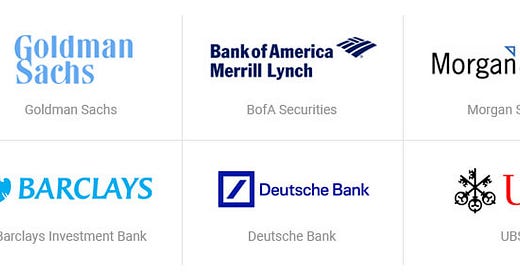Industry Notes: Investment Banking for Lawyers (Part 1)
📝Our first industry note on investment banking. We will keep adding parts, post each interview.

In the simplest form, Investment Banks help connect corporations in need of capital to institutions who are looking to invest i.e. startups to funds, large corporations to lenders and private equity investors etc. The capital raise in itself takes a lot of forms and shapes: debt, equity, convertible instruments etc e.g. you would have recently read about Morgan Stanley (a large investment bank) which advised Reliance Jio on all of its equity fundraises.
An ibank is expected to (a) create interest for the deal among investors in the market; (b) help create the story which will be used for the fund raise; (c) prepare a business plan which will help justify the story; (d) structure the deal to meet expectations of both parties; and (e) co-ordinate the business diligence.

Ibanks are typically classified as:
“Bulge Bracket” (these are the biggest banks and include names like Goldman Sachs, Morgan Stanley, Rothschild and Jefferies; they do the largest deals, have an international presence and connect international investors to large international or local businesses).
“Mid-Market” (deal with mid-size businesses and have a national presence in a single geography; connect domestic and international money to local businesses; Spark and Avendus are in this category).
“Boutique Banks” (specialize in a certain industry e.g. pharma / automotive / energy etc. e.g. Veda Corp in India which specializes in healthcare deals is one such ibank; certain boutique banks specialize in stages e.g. early stage startup deals e.g. Rainmaker which specializes in startup deals, is another).
As per the Association of Investment Bankers of India there are approx. 1500 such Investment Banks in India (the number would be more skewed towards smaller local one person ibanks, with 10-15 bulge bracket ibanks operating in the country).

Senior ibankers manage relationships with big money on one side (read pension funds, private equity funds, fund of funds, endowments, family offices etc.) and corporations on the other side.
Junior bankers work on valuations and create excel models & pitch books. They are expected to have a strong hold over excel, financial modelling and corporate finance.

A simple DCF model | Courtesy: Wall Street Prep
On the revenue side, ibanking is also a services business like law, with revenue coming from success fee ranging between 1-2% of deal size e.g. 2% on a 100M USD fundraise would mean USD 2M in fees for the IB; (Just to offer a comparison, law firms typically make between .05 to .1% of deal size as transaction fees - the key difference being lawyers make money irrespective of the success or failure of the deal).
Hiring at an Analyst level happens from institutions like SRCC and IIT’s with a large number of Chartered Accountants and CFA’s also being inducted.
Most of you, who work as corporate lawyers on the debt or equity side would have interacted with some of these bankers, which should help you find connects in these ibanks which would help you break through. A CFA would also help given that preparing valuations is a fundamental part of the job. What would also help is a sense of corporate finance and internships at a couple of these ibanks.
P.S. Also sharing a video below of a talk by Harsh Parikh, Former Director of IB at DSP Merrill Lynch which will give you some more perspective.
Please post in the comments to give us feedback and tell us more about what you would want to read. If you like this please forward this article and share by clicking on the “Share” link below 👇



